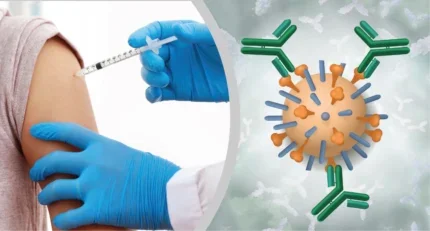
Some vaccine-preventable diseases (VPD) are resurging due to stagnating or declining rates of vaccination and insufficient population immunity. Of particular concern are highly contagious diseases such as measles and whooping cough, which cause significant morbidity and mortality in children.
Laboratory tests play an important role in acute diagnostics, immune status determination and epidemiological surveillance. Acute laboratory diagnostics are generally based on PCR-based direct pathogen detection and serological detection of IgM antibodies and/or a significant titre increase in IgG antibodies.
The presence of pathogen-specific IgG antibodies in cerebrospinal fluid can support diagnosis of acute central nervous system infections such as meningitis or encephalitis. To determine an individual’s immune status, the specific IgG concentration in serum is quantified in relation to international reference material. If no reference material exists, for example for mumps virus, the assay can help to assess previous exposure to the pathogen or vaccine.
EUROIMMUN (part of Revvity) offers an extensive range of ELISAs and chemiluminescence immunoassays (ChLIAs) for determination of IgG and IgM antibodies against different agents of VPD. These are complemented by selected real-time PCR assays for direct pathogen detection. All analyses can be fully automated using state-of-the-art instrumentation and software for increased efficiency and standardisation.
Optimal antigens
The antigen preparations used in EUROIMMUN immunoassays are designed for optimal performance in each application. For example, use of recombinant proteins for detection of IgM against measles, rubella and varicella zoster virus (VZV) ensures high specificity.
For detection of IgG antibodies, viral lysates provide high sensitivity. Inclusion of antigens from vaccination strains, for example for mumps virus, helps to boost the serological detection rate in vaccinated individuals.
Assays for detection of antibodies against Bordetella pertussis are based on specific pertussis toxin (PT), which enables exclusion of B. parapertussis infection. For tetanus and diphtheria, assays based on toxoids from the respective bacteria enable determination of the immune status and vaccination control.
Dried blood spots
The newly launched EUROIMMUN Anti- Measles Virus ELISA 2.0 (IgG) offers the option of using either dried blood spots (DBS) or venous blood as starting material. With DBS only a small blood volume is required, and logistical aspects such as sample collection, storage and transport are simplified. At the diagnostic laboratory, the DBS can be punched out and analysed using automated systems. Further ELISAs for use with DBS are in development.
Direct detection
EUROIMMUN’s serology offerings are complemented by real-time PCR assays for direct detection of selected pathogens. A EURORealTime assay for detection of respiratory syncytial virus (RSV) including differentiation of the viral types A and B has recently been introduced. Vaccination or immunisation to RSV is now recommended in many countries for older persons, pregnant women and infants.
Also offered are PCR kits manufactured by GeneProof (part of NuvinkaDx), for example, for detection of VZV or for detection and differentiation of B. pertussis and B. parapertussis in a single reaction.





